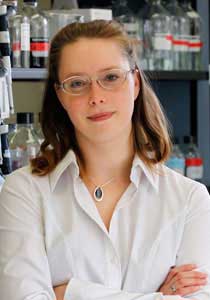One of the keys to Marketon’s course design is her use of “Readiness Assurance Tests (RATs),” quizzes at the beginning of class that hold students accountable for their preparation for class. After individually taking a multiple-choice quiz about concepts from the required reading, the students then take the quiz again in small groups. These quizzes encourage student-to-student interaction and obviate the need for Marketon to spend class time covering basic concepts.
For the group quiz, Marketon uses IF-AT multiple-choice scratch-off sheets that provide immediate feedback on their responses. Similar to scratch-off lottery tickets, groups can keep scratching until they get the right answer. But the groups are also awarded fewer points for each incorrect scratch for a question. Marketon uses the completed scratch-off sheets to assess, at a glance, what questions and concepts were particularly difficult for many groups. “It’s really easy for me to just skim over them and look to see where the problem questions were…Wherever it took multiple scratches, I know that was a sticking point…And I know that I can give a very limited lecture that focuses on those tough points.”
Marketon also leverages students’ competitiveness to build their scientific communication skills. In Class Contests, groups regularly compete for the distinction of best figure, analysis of the data, or section of a lab report. At the end of the semester, members of the group which secured the most contests win the Course Race and receive an automatic “A” on the comprehensive final exam. “If they’re winning the class contests, then they’ve been winning points all through the course, which means they’ve been learning all of the concepts all through the course and they don’t need to rehash all of that. They’ve met all of the goals that I set out for them.”
Team-based learning has provided Marketon with strategies that fit her teaching and learning goals and she has been encouraged by her students’ development as future scientists. With team-based learning, her students are far more engaged in class and are particularly excited to participate in Class Contests. Furthermore, her students are doing higher level assignments. “I can expect more from a group as a whole than I ever could from any individual student. I can see that we’re able to do more now in this course than we were before. The learning objectives that I have are a little more sophisticated now than they were before.” Marketon’s students often remark on the transferable knowledge and skills they have developed in the course.
Because of her own experiences as a learner and observations as a teacher, Marketon has striven to create an interactive learning environment where students are both minds-on as well as hands-on. Her next innovations into teaching include peer review of the Class Contests and additional open-ended laboratory experiences. “I see it in practice: the more interactive the experience is, the more students are going to get out of it…It’s my challenge then to incorporate that into my teaching strategies.”
Melanie Marketon is an assistant professor in the Department of Biology. She earned her Ph.D. from the University of Texas at Dallas and studies the regulation of virulence in plague.


